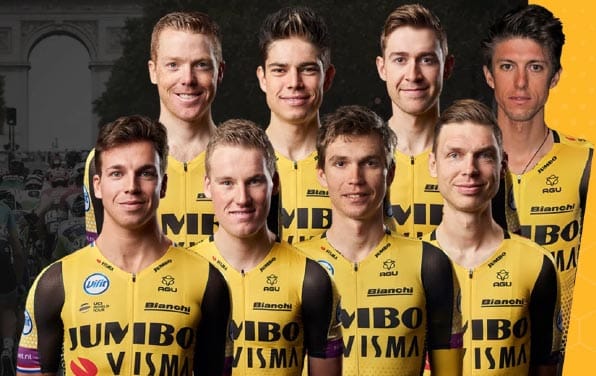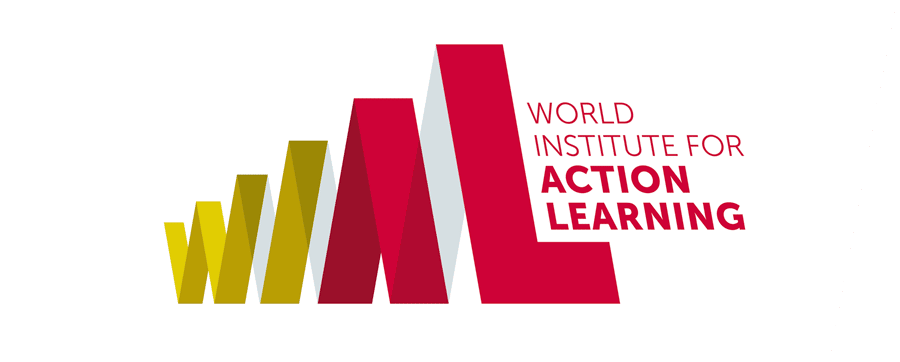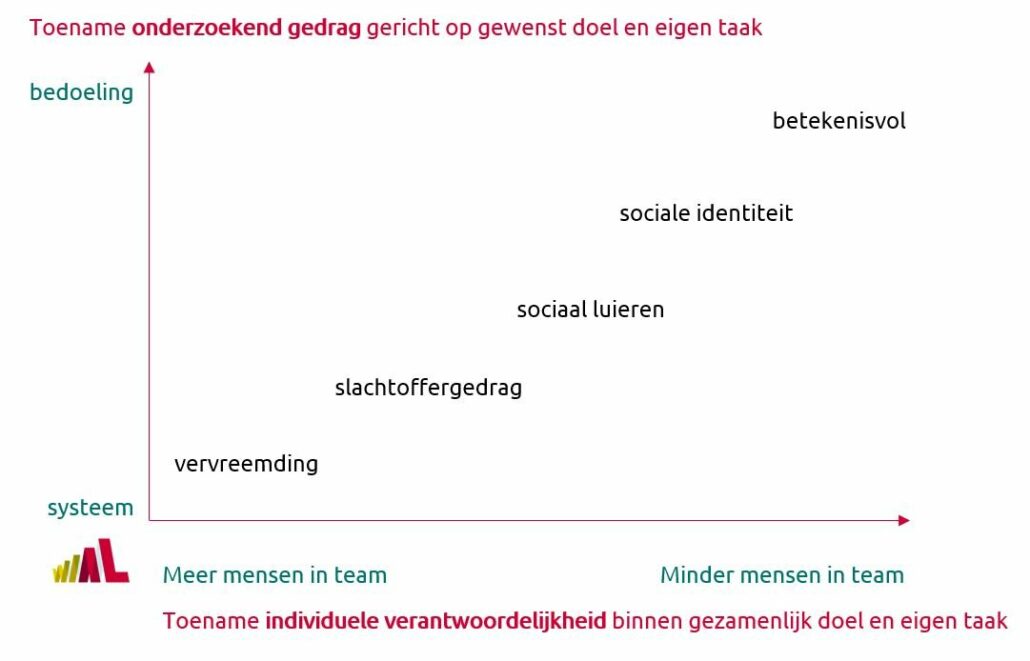
Why is Jumbo Visma the example of a High Performing Action Learning team?

Over the summer I took a month off, vacation.
I manage to distance myself from my work quite well.
But ignoring sports successes is impossible for me, it works on me like a magnet.
Last year (2021) that was TeamNL at the Olympics, this year (2022) the performance of the Jumbo Visma team at the Tour de France. I started watching, listening and reading. What an Action Learning Team that is! A nice touch is that the environment has already determined that the team consists of 8 riders, the ideal number for a team, at least that's step 1.
Action Learning = P + Q + R
I have written 7 blogs about this. In each little blog I focused on: (P) programmed knowledge (R) reflection and (Q) questions. I have put these blogs together in this article. Enjoy reading!
What are the elements that Jumbo Visma believes contributed to the results?
- You have to have a vision and go for it together;
- The leadership of the team reflected well and honestly;
- You have to learn from loss;
- You have to learn from what goes well;
- Don't assume just anything;
- Not waiting for the Dutchman on their team to win the tour;
- Use science.
In the blogs, I went into a bit more detail about the similarities with action learning in the 7 individual elements. Very interesting for me as a team coach.
When is it interesting for you
to watch a team like Jumbo Visma?
1. Jumbo Visma has a vision that revolves around individual performance and cooperation as a team!
Vision is the first element of seven that I describe, following the success of Jumbo Visma's cycling team.
Your best bet if you want to win a yellow jersey or get any kind of result is to focus on improving your own performance: getting a little better every day. A vision that many embrace, in sports one team does this better than another. In organizations, this is often less the case. There is often a lack of patience for this, in my experience.
When I coach a team in an action learning pit stop, it's not that difficult because we work outside of practice. So that's not playing a game but that's just training. But that's where it starts, simple by having everyone at the beginning of the session answer the question: what skill are you going to work extra on today? And answering the question: what do we want to learn as a team?
In daily practice, however, it becomes a lot harder, the team is less concerned with the performance and more concerned with the result. And that while everyone on the team knows that if you improve your performance every day, you get the best out of yourself. And so that's maximum results. But yes, on one team the coach gets more time and is allowed to fail more than on the other team. Just look at how long a coach or manager is allowed to keep working with a team when results are not being achieved (yet). If you believe in this vision, make sure you also name performance and progress in performance! The results will then come naturally.
"If you make more crosses (performance) you automatically start scoring more,
if you ask more questions (performance) you automatically become more innovative!"
Which makes me wonder: in today's dynamic and uncertain (VUCA) times, does a team have any other more sensible choice than to get a percent better every day?
This vision has not hurt the team at Jumbo Visma. One success followed another. For the simple reason that they work with people who are only concerned with one thing - getting one percent better every day.
Where in the process of Jumbo Visma do you recognize your own work situation?
! TIP: a very readable book about this is Atomic Habits by James Clear
The next section is about element 2, reflection and experience, how did this vision come about?
2. Team leadership reflected well and honestly
Reflection and thus experience is the second element of seven that I describe, following the success of Jumbo Visma's cycling team.
After several years of varying success, the Jumbo Visma leadership came to the bold conclusion, "With little experience and rash behavior, you can kill anything."
Honestly, I sometimes hold my heart when I see people who start working confidently with barely or no experience, with sometimes quite a lot of theoretical (books or course) knowledge. So is that an example of rash behavior that Jumbo Visma is talking about? And what are you helping to kill? A sports team's victory, a company's profits, someone's career or a human life? Over the years I have come to the realization that if you want to grow and gain experience you cannot avoid taking risks. Indeed, a team in which people are allowed and dare to take personal risks is essential for growth. Not for nothing is psychological safety so trending!
Pretty complex huh!
I think it is a moral responsibility of everyone, at all times, if you are pursuing something, to identify the risks. Any executive who wants to lead from experience can then ask you two questions:
- is the risk acceptable?
- Is the risk real or is there a (limiting) belief behind it?
Only then can you work on experience as an executive and you can continue to learn as an executive, I think.
With the current personnel shortage, in almost all sectors, an extra focus is required! Due to high workloads, more and more people are being inducted faster with minimal supervision. They do gain experience, and what is own reflection and peer reflection on the experience really worth? Without reflection it is worth less in any case, or how do you see it?
"Experience is a long chain of reflections"
So how much risk are you consciously running as a manager if you do not encourage the chain of reflections? And how reckless is that behavior? In the vision of Jumbo Visma, shouldn't you at least reflect daily on what I am and on what I improved another percent today? Then at least you have one guarantee. You become a little more experienced every day, with experience that matters. And that is Action Learning. Not going straight into the classroom and getting certificates, but learning in practice by actively reflecting experience together.
Jumbo Visma did kill a seemingly certain victory in the past. And that through inexperience and rash behavior. But by sticking to the vision of getting a little better every day, the results, it seems, have come naturally.
What do you want to get one percent better at every day?
! TIP: very worth reading are Amy Edmondson's books on psychological safety and Teaming.
3. You must learn from loss
Learning from loss is the third element of seven, which I describe, following the success of Jumbo Visma's cycling team.
"To win a round of France, it helps to lose a lot first," said the Jumbo Visma technical director. The team just missed out on victory twice, sometimes in a clumsy way. Pretty tough when that happens to you and because then to see it mainly as a learning process. In fact, half of the Jumbo Visma team left the team disappointed. Years of building gone, or did they? The other half, who stayed, suddenly showed much more resilience. And that resilience was exactly what was needed. This realization grew with the circumstances, over which the team had little influence. Like the opponents as the best example. Besides the sport, the present time teaches us more and more that social engineering, let alone guarantees of success, are not realistic. The only not insignificant guarantee of failure you have is that you gain more experience.
Experience, in my opinion (see previous blog) is just that, what can make the difference. If unexpected, sometimes ugly moments happen to you as a team, it helps if you have experienced something similar before. The Jumbo Visma team, believe me, have encountered them again this tour. They just handled it differently.
How do you get your team to turn loss and mistakes into learning opportunities?
"Sometimes you win sometimes you learn"
From my experience, some organizations handle this completely differently than others. This often has to do with people's beliefs and mindset. Both leaders and team members. Last but not least, this often determines how loss and mistakes were handled in the past. Did dealing with losing energize the team? Perhaps unremembered traumas actually emerged? Another obstacle, perhaps the biggest, is that team leadership only judges by results and there is no turning back. Also, or especially, sports excels at this in a negative sense. And as happened at Jumbo Visma, that half the team dropped out? How is that a loss. I am curious, how the leadership of Jumbo Visma looks at that now.
What weighs more heavily for the leadership: the loss of half or the increased resilience of that other half?
This question will never be answered unequivocally. The answer to this question is the beginning of what it all started with at Jumbo Visma: VISION!
How does your organization deal with loss?
My next blog is about the opposite, learning from what goes well.
! TIP: the book mental innovation by Hans van Breukelen might be interesting to read.
4. Learning from what goes well
Learning from what goes well is the fourth element of seven, which I describe, following the success of Jumbo Visma's cycling team.
My previous blog was about the importance of learning from what went wrong. So now the opposite. The question that then immediately comes to mind is: How (or when) does a team learn more from losing or more from winning and why?
What is so strong at Jumbo Visma is that they don't look at the victory, the result. They look at little things that go well. For example, I read that last year as a team they cycled their main opponents on a mountain at a distance. This did not last long, because a few kilometers further on they were caught up again. The team then analyzed what was going well when they rode the opponent behind. And that is exactly what Jumbo Visma used to put their main opponent behind for good this year. By doing that one thing that went well even better and more often, they won the Tour.
So don't be guided by the end result, but look at parts or phases where something went well. That's usually obvious in a win. But so did Jumbo Visma in a loss.
So also ask the question, What went well in a failed consultation? Or in whatever failed activity. A shame, after all, if you don't appreciate what you did well because the end result frustrates you. That's why in Action Learning meetings we always ask the questions: What went well and what can be improved. Regardless of whether it was a good or bad session.
What I learn from Jumbo Visma is that it does revolve around the end result. But a one-sided focus on the end result also distracts from what can be improved in the process. It distracts from the sometimes many small things that a team must continue to do very well together.
"Let go of the result,
if you play well, you will win by yourself."
What does it take in your team to continue to see, even in the face of adversity keep seeing what is going well?
My next blog, four of seven is about not assuming just anything.
Always Inquire, Never Assume: ANNA principle.
! TIP: books and articles on appreciative inquiry might be interesting to read.
5. Don't take anything for granted
Not assuming just anything is the fifth element of seven, which I describe, following the success of Jumbo Visma's cycling team.
The biggest mistake Jumbo Visma could make now is to assume that they will win the tour more often for the time being. After all, they have a tour winner who is still young and can last for years to come. Fortunately, they don't.
This statement is more topical than ever as far as I can remember. So many unexpected situations arise in the world and in organizations. Everyone needs to stay sharp and continually learn. Someone can be perfectly happy with their job, and what happens when suddenly a recruiter comes along with a better offer.
My WIAL partner Christoph Maria often calls out ANNA principle. Always Inquire Never Assume. This can prevent a lot of misery. How often does it happen in your team or organization that action is taken based on faulty assumptions? This is quite unfortunate, if it is not learned from and leads to wasted energy.
I think any self-professional organization may be and remain keen on this. People in the organization should at least be aware if someone is acting on an assumption. Sometimes a person has no choice. Possibly when it comes to people. Then a wrong assumption, well-meaning too, can lead to a socially and psychologically unsafe working environment.
Four questions by Byron Katie (source The Work) I have in my tool bag for such cases. These questions potentially set assumptions on edge.
- Is it true?
- How can you be absolutely sure it's true?
- Who are you with that thought?
- Who would you be without those thoughts?
Usually it is not true, with which the assumption is unmasked. And towards the true problem can be worked. So that is a matter of inquiring.
My next little blog is about not waiting for the Dutchman to win the tour.
! TIP: books and articles The Work of Byron Katie
My next blog, six of seven gaar about not waiting for the Dutchman to win the tour.
6. Not waiting for the Dutchman on their team to win the tour
Not waiting for the Dutchman to win the tour is the sixth element of seven that I describe, following the success of Jumbo Visma's cycling team.
For a Dutch team, it would be extra nice if a Dutch rider is successful. If only for the publicity it generates in their own country. Chauvinism is not foreign to the Dutchman. To justify this, the label talent is often used. Then you suddenly hear: 'Holland has a talent!"
However, the team's leadership makes short work of this: "Whether someone has talent cannot be recognized so early. Thus, "Focusing the team on achieving success with one person is disastrous, despite the fact that cycling is all about individual gains.
In the WIAL NL Team Podcast S1E01 I discussed this at length with Sanne and Aik. In it it became apparent that of (both having once had talent status), one was comfortable with being designated as the pivot of a victory. But the other did not like that at all. I don't think there is anything wrong with one person's personal contribution or achievement being given extra emphasis. That is then factually correct.
In my opinion, this is different when naming one talent, after all, the expected performance is in the future and does not have to become factually correct. When people are praised for their talent it can create positive pressure. Just as well it can lead to a feeling of if it doesn't work out then apparently I don't have enough talent after all. I find that unfortunate, because effort and perseverance usually win out over talent anyway and strong teams can bring out the best in an individual. Right?
What does the word talent evoke in you?
! TIP: read more biographies these I often find very informative
My next blog is already the last in this series and is about "use science"
7. Use scientific knowledge
My last blog in this series is about Jumbo Visma's insight on the use of scientific knowledge. Since I can't keep it within the maximum size allowed, I've split it into two parts.
In cycling (or physics), I can well imagine how scientific knowledge is used. I see cyclists pedaling against the wind in wind turbines or working on their fitness at high altitudes. In doing so, much of the physiological performance is measured. Sport and science have made a beautiful alliance here. This was not always with the right intention, just think of the doping scandals of the past. The pursuit of success can spill over, shall we say. Fortunately, fair-play has won out and science contributes to cycling and other sports. This leads to better performance and fewer injuries. In physics, it is even clearer. What gravity is there is little doubt among ordinary citizens. But for theoretical physicists it is still not entirely clear.
I wonder how trainers and coaches have ever applied scientific knowledge in team building or motivational coaching? Perhaps it has occurred, but I rarely come across it.
The question that has occupied my mind for years is: to what extent does it make sense to improve teamwork and leadership using scientific knowledge? Isn't there more often coincidence, rather than an observable pattern?
I don't really dare make a statement about it. Especially from the knowledge, that most scientific knowledge now comes from statistical analysis, discovering precisely, what remained hidden from the normal observable. For example, I use Jung Action Typing, I am immersing myself in TMA and reach out to MBA students literature to address their challenges. All three involve static analysis. Yes and I also measure, for example, whether progress is being made in the number of questions people in a team ask each other. Can I call that scientific knowledge?
More and more often I read that scientific findings were not quite right after the fact. Just this week I read a piece about the famous marshmallow experiment. Nine hundred children were given a marshmallow. If they left it untouched for fifteen minutes they got two. If they ate it within fifteen minutes, they got one. It was later found that the children who were patient and could wait fifteen minutes for their reward were more successful later. Scientific evidence that children who can hold back and go for a better long-term outcome? That was the conclusion. Yes said, a nice return on the experiment.
So no! Later it turned out that children who were not so well off at home were not used to getting more and ate their food quickly. So they did the same with the marshmallow. So there was probably more behind it that made them less successful! The opportunities they got because of their origin? It shows once again that context can have so many more influencing factors in it. A reason to be very careful the shelf life of scientific insights. Personally, it helps me to change a mindset of certainty to a mindset of probability. When I look at Jumbo Visma with that, I have the insight that: science helps very well in the so-called beta aspects, in the alpha aspects in which I work I certainly don't have that yet].
What role does science play in your work?
! TIP: Find your own balance. as Rene ten Bos once said: even worse than blindly accepting everything is to disregard and ignore everything.
This was blog 7 of 7 about insights from a cycling team. Got any feedback? Fine, let me know!
World Institute for Action Learning - Netherlands, Twan Paes MBA MALC, October 2022.







